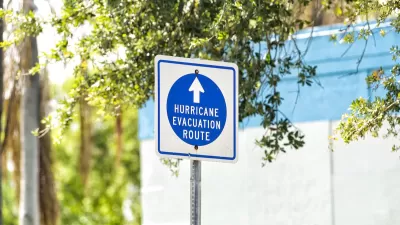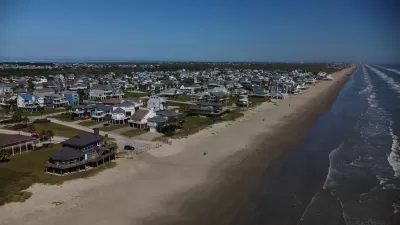Inequalities in the housing market of coastal North Carolina communities have already been exacerbated by the effects of extreme weather and climate change.

Jodi Helmer reports on the state of the housing industry in coastal North Carolina—the geographic region most frequently hit by hurricanes between 1968 and 2000, with more expected to come. "[I]n a 2019 report, the National Oceanic and Atmospheric Administration said that North Carolina cities such as Wilmington and towns like Beaufort and Duck could expect two- to threefold increases in tidal flooding within the next 10 years," according to Helmer.
Despite this history, and the current and future risks, housing growth rates are rising faster in North Carolina's coastal areas than areas farther inland. "The number of people buying beach homes in the Tar Heel State increased 114 percent between 1960 and 2010," according to Hemler. "And over the last decade, North Carolina has allowed more than 9,000 houses to be built within high-risk zones. (New Jersey and Florida have done the same.)"
In this market, new kinds of risk have emerged in the residential real estate market, including a dynamic called "underwatering," as coined by Jesse M. Keenan, an associate professor of real estate at the Tulane University School of Architecture in New Orleans, in an article published in June in the journal Climatic Change.
The term "refers to the ways environmental exposure and climate change impacts influence people’s participation in mortgage markets," according to Hemler. Namely, banks are asking homebuyers to put as much as 40 percent down on a mortgage agreement to address the risk of buying a home in an area at high risk of flooding.
The consequences of this mortgage practices are widespread: sellers will have less with which to buy their next homes. Buyers must have more money, effectively pricing out large numbers of potential homebuyers. The means to afford flood insurance can further widen the market.
Hemler provides a lot more detail on the realities of inuring the housing market in the high-risk coastal areas of North Carolina. The state also has a program designed to mitigate some of the risk of property damage, a strategic buyout program called ReBuild NC that offers fair-market-value to homeowners located in areas at high risk of damage from hurricanes and floods.
Previous Planetizen coverage of North Carolina flooding and climate change risk:
- Deciding Not to Rebuild After Climate-Related Disasters (April 2020)
- Awareness of Climate Change Threats Doesn't Motivate People to Act, Study Finds (October 2019)
- Living Shorelines for Storm and Flood Protection (June 2019)
- Looking Beyond FEMA Flood Maps, Cities Raise the Bar for Buildings in Floodplains (April 2019)
- North Carolina Reconsidering its Stance on Climate Change (December 2018)
- Welcome to a Changed Climate: It Even Floods When it's Sunny (June 2016)
FULL STORY: Climate Change Floods North Carolina’s Housing Market

Planetizen Federal Action Tracker
A weekly monitor of how Trump’s orders and actions are impacting planners and planning in America.

Map: Where Senate Republicans Want to Sell Your Public Lands
For public land advocates, the Senate Republicans’ proposal to sell millions of acres of public land in the West is “the biggest fight of their careers.”

Restaurant Patios Were a Pandemic Win — Why Were They so Hard to Keep?
Social distancing requirements and changes in travel patterns prompted cities to pilot new uses for street and sidewalk space. Then it got complicated.

Platform Pilsner: Vancouver Transit Agency Releases... a Beer?
TransLink will receive a portion of every sale of the four-pack.

Toronto Weighs Cheaper Transit, Parking Hikes for Major Events
Special event rates would take effect during large festivals, sports games and concerts to ‘discourage driving, manage congestion and free up space for transit.”

Berlin to Consider Car-Free Zone Larger Than Manhattan
The area bound by the 22-mile Ringbahn would still allow 12 uses of a private automobile per year per person, and several other exemptions.
Urban Design for Planners 1: Software Tools
This six-course series explores essential urban design concepts using open source software and equips planners with the tools they need to participate fully in the urban design process.
Planning for Universal Design
Learn the tools for implementing Universal Design in planning regulations.
Heyer Gruel & Associates PA
JM Goldson LLC
Custer County Colorado
City of Camden Redevelopment Agency
City of Astoria
Transportation Research & Education Center (TREC) at Portland State University
Camden Redevelopment Agency
City of Claremont
Municipality of Princeton (NJ)





























